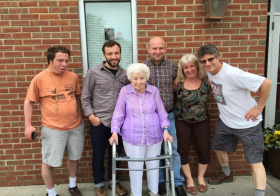The Busch Family
You are here

We were living with 22q before anyone had heard of 22q. Our son Mike is now 35 years old. He was born in 1983, 10 years before the test to identify the deletion was developed. Mike is the middle son of 3. You can see him on the left in the picture. Our family has encountered various crisis times in our journey with Mike. The first crisis was when Mike was born. He was sent to neonatal ICU because of respiratory distress. The cardiologist told us that his lungs had filled with fluid and he would be needing heart surgery. He never needed the heart surgery, however numerous other physical problems ensued in his infancy. He had low weight gain, slow development, low muscle tone, esophageal reflux, nasal regurgitation, and multiple odd infections and pneumonias. He was hospitalized six times the first two years of his life. When he turned eight months old, he started having episodes where he would turn blue, stop breathing, and require CPR. Those episodes were the scariest part of his infancy. Luckily he outgrew them by the age of two and a half. He had lots of diagnoses, but not the one diagnosis that would have explained everything.
In his early childhood, he became healthier and the multiple illnesses of his babyhood receded into the background. This period was notable for continued developmental delay, short stature, and terrible teeth. He continued to develop, but at a rate approximately 2 years behind his same age peers. His father and I were good at denial and attributed his delays to the fact that he was so sick the first 2 years of his life. We expected things to normalize, but they never quite did.
Later childhood issues included anxiety and difficulties in learning. The crisis was figuring out the best way to educate Mike. He was very good socially, but on so many other levels he struggled. Mike was in special education, but also mainstreamed for most of his school years. He hated being in special education, but when he wasn’t struggling with schoolwork, Mike had lots of adventures playing with his brothers and the neighborhood children. He had a happy childhood.
In early adolescence he started showing signs of psychiatric problems. It was at that point that he was diagnosed with 22q. The diagnosis was a comfort. It meant answers to so many questions. There weren’t any support groups for families with 22q in our area at the time, or other mothers to talk to, but the internet was a source of information, direction, and understanding.
Adolescence for Mike was a mixed bag. He had many friends and was well loved, but he was more vulnerable to peer pressure than the average adolescent. It may have been part of his developmental disability, but he lacked judgement. He experimented with drugs and got in trouble with the law.
The next major crisis was transitioning from the structure and routine of school to life after graduation. Mike wanted to go to college like all his friends. He had the same expectations as his peers, but couldn’t do the course work. As it had been difficult for us to accept his limitations, it was also difficult for him. First we tried a local transition work program at a local college where he stayed on campus and worked in the cafeteria. That was a failure because he developed mania and psychosis. He returned home and it took at least 6 months to stabilize him. He still wanted to try to go ‘away to college’. We found the Pace Program in Chicago. It seemed perfect for him and it started out great, but again the psychiatric problems exacerbated and again he returned home. Another failed experiment. Once home, he became so depressed, he tried to kill himself by setting himself on fire. He sustained 60% full thickness burns and was hospitalized for almost 3 months. The recovery was long and difficult. You can still see the scars on his face in the picture.
He moved out of our home around 10 years ago into supported living. This stage is bringing a whole new set of challenges and adventures. Some of the companies providing supportive living services have been rather dicey. As we advocated for Mike in the hospital and at school we are also advocating for him in his supported living situations.
Over the past ten years he has been living in different houses and apartments—all with different issues. He now lives in a condo with his girlfriend who is also developmentally disabled. They both need supports in the home to help with cooking, cleaning, laundry, shopping, and budgeting. The love they have for each other is palpable. They communicate well and accept each other totally. They have been asking for us to help them get married for the past 3 years. They are having a commitment celebration in August.
This is only a brief sketch of our life with 22q. If you are interested in more detail, it can be found in the book, Yearning for Normal. Our journey has been difficult at times, but it is also filled with love, laughter, and mercy. I wouldn’t trade this journey for another easier one. I know his two brothers learned wisdom and compassion through having Mike as a brother. They also learned that there are no easy answers, that pain is part of living, and grief is part of the journey in all our lives, 22q or not. We’ve learned that failing and falling are also part of living. I have learned that I cannot fix or control so many of the things I’d like to, even though I keep trying.
In the words of the song Amazing Grace, through many dangers toils and snares we have already come, its grace that brought us safe this far and grace will bring us home.